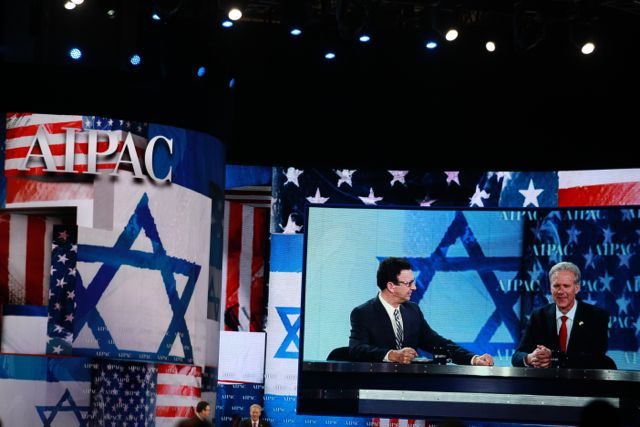
I am an American. I am neither an Israeli, nor am I a Palestinian. However, I am a Jew, and a pro-Israel American, who lives in a country which has strong, positive relations with Israel. As a Zionist, I see it as my job to defend Israel as a Jewish State, and that means protecting its democratic character.
The one, and only, time, that I attended AIPAC’s Policy Conference was in 2012, when I was a junior in high school. I was, at once, bewildered, and also somewhat disappointed. I was amazed by the 13,000 other pro-Israel Americans who had flocked to Washington, D.C. to learn, to advocate, and to lobby. I was amazed to hear President Obama, Prime Minister Netanyahu, and various GOP candidates sacrifice valuable time on Super Tuesday, the height of their primary elections, to address AIPAC.
At the same time, though, I felt there was something missing from the conference. So upon returning home, I began searching for literature and organizations that were pro-Israel, but discussed what the “classical world” of Israel advocacy was not: namely, if Israel was only doing the right things, why was there no peace yet? In the “classical world” of Israeli advocacy, I was taught that the onus was on the Palestinians, but all around me on my university campus, I was being told that Israel shared the blame, too. And I couldn’t just dismiss those claims like I had been taught.
This past week, Israel came again to the forefront, with Columbia’s chapter of Students for Justice in Palestine hosting its Israeli Apartheid Week, and the firing of dozens of rockets from the Gaza Strip into southern Israel. And, again, I was forced to reengage with the possibilities that, perhaps, Secretary Kerry’s negotiations are futile: it will all go down in flames, rockets will not stop terrorizing Israelis, and we’ll be back to square one.
That, in essence, is the despondency that I got out of my AIPAC experience in 2012. The Arab Spring would doom the Middle East, the Palestinians would refuse to negotiate, and Iran is a nuclear duck. And that forced me to question: If I cannot change the Palestinians, what, then, is the point? That is the question that I was forced to ask once after attending AIPAC, again after Israel’s military operations in Gaza, and yet again after reading about the barraging of rockets from Gaza into Israel.
And the answer to that question is that I can’t change the Palestinians. Israel will, forever, remain a permanent mark of Western imperialism upon the face of a region which has been hurt terribly throughout the early modern and modern eras by the Western Europe that Israel continues to represent to Arabs living in the Middle East. And that is something that no one — not Bibi, not Abbas, not Obama, not Kerry, not J Street founder Jeremy Ben-Ami, and, least of all, not I — can ever change. What we can change, however, is Israeli society and the way Americans perceive both Israel and Palestine. And we can engage with the reality in a constructive way that vilifies the inexcusable violence of the Palestinians, without dismissing their hatred of Israel.
Ultimately, that is the allure of the liberal Zionist movement, as critiqued by the new documentary,The J Street Challenge. But the movie’s claims and the claims made in its trailer (it is not available publicly yet, except through prearranged screenings) are wrong, this is not an allure or an allusion: this is the reality with which we must contend. We cannot win this perpetual battle by dismissing the arguments lodged against Israel in the academy with counter-protests and blue-and-white cupcakes, because that is not the way to win anyone over. Instead of simply responding to rhetoric with more rhetoric, which neither side will accept, we can, instead, begin to educate.
That, to me, was the appeal of the liberal Zionist movement, and why I did not feel welcomed in the institutional pro-Israel community represented by AIPAC. As a university student, I must engage actively with the beliefs that Israel is an apartheid state which are as real and deep-rooted to the other side as my Zionism is to me, and I cannot dismiss them out of hand.
Instead, I can see what I can do, and what my side can do. And what I see is that we are not doing enough. That is why I critique the Israeli government. That is why I see the occupation of Palestinian territories as not sustainable. I will critique through writing, and, therefore, by educating. By disengaging from the hopeless back-and-forth of rhetoric, and actively seeking to delve deeper into the intricacies of both Israeli and Palestinians societies, I can hope to create change here, in America.
Yes, I understand that checkpoints save lives from terrorism, that the P.A. is not going to recognize Israel as legitimate, and I have seen (although, thankfully, not experienced) the conditions under which Israelis live in towns like Sderot. These issues must be contended with, and they must be dealt with, but they cannot be dealt with by hurling rhetoric back and forth. They must be dealt with by understanding the values and the sentiments that Palestinians living under the occupation feel, in conjunction with the sentiments of Israelis. It is organizations like J Street and other liberal Zionist organizations, which have begun to take this on, and that work must continue.
We cannot live in the shadows, pontificating about the needs of the Israeli government. The Jewish State, as it is right now, is unsustainable, and the American pro-Israel community needs to understand this, and the way we will arrive at this understanding is by actively engaging with the realities of the other side of the negotiating table, not just by dismissing them out of hand. If we expect them to accept the reality of our existence, we must be ready to understand the real reasons behind their hatred.
Amram Altzman is a student at List College.

